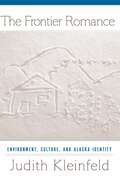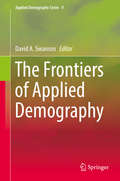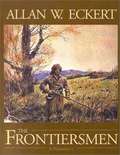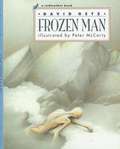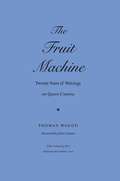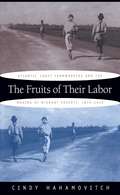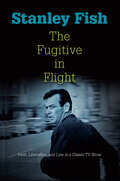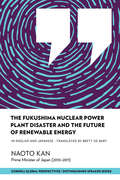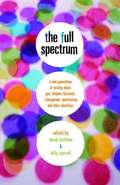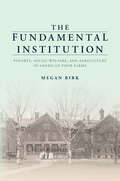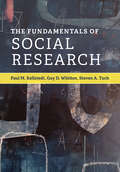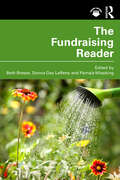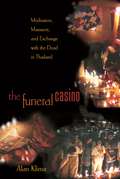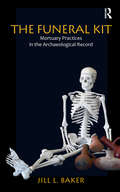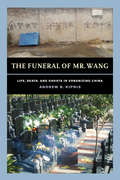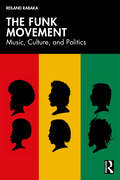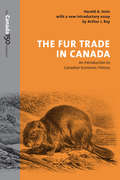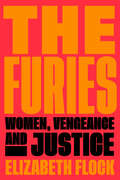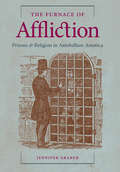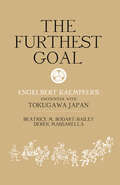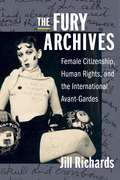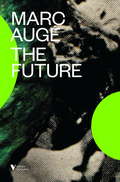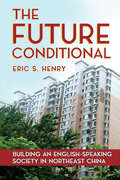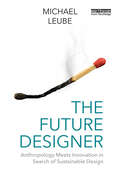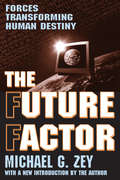- Table View
- List View
The Frontier Romance: Environment, Culture, and Alaska Identity
by Judith KleinfeldAnyone curious about what drew people like Christopher McCandless (the subject of Into the Wild) and John Muir to Alaska will find nuanced answers in Frontier Romance, Judith Kleinfeld’s thoughtful study of the iconic American love of the frontier and its cultural influence. Kleinfeld considers the subject through three catagories: rebellion, redemption, and rebirth; escape and healing; and utopian community. Within these categories she explores the power of narrative to shape lives through concrete, compelling examples—both heart-warming and horrifying. Ultimately, Kleinfeld argues that the frontier narrative enables Americans—born or immigrant—to live deliberately, to gather courage, and to take risks, face danger, and seize freedom rather than fear it.
The Frontiers of Applied Demography
by David A. SwansonThis book details cutting-edge methods and findings that may shape the future of applied demography. Inside, readers will discover new insights into the databases, substantive issues, and methodological approaches that can help them to improve how they use demography in decision making and planning problems in both public and private settings. The topics and perspectives are found in the book's 23 chapters, which are organized into three major sections: (I) Demographic Information for Decision-Making: Case Studies; (II) Data: Issues and Analyses; and (III) Projection and Estimation Methods: Evaluations, Examples, and Discussions. Coverage includes chapters on migration, demographic market analysis, future courtroom needs, trends in the needs of the elderly, access to health care, longitudinal data systems, census costs, and new approaches to small area estimation and projection methods. The case studies represent a wide range of countries, including Australia, Canada, China, England, India, Japan, and the United States of America. Overall, this edited volume collects papers that were presented at different conferences, including the 8th international conference on population geographies (University of Queensland, 2015), the 2014 Applied Demography Conference (San Antonio, Texas, USA), and the annual conference of the Canadian Population Society. Applied demography touches many aspects of our lives and its practitioners continue to push methodological and empirical boundaries. This book documents the steady evolution of this field. It shows demographers, sociologists, economists, planners, marketers, and others how they can improve the quality and relevance of demographic information now and in the future.
The Frontiersmen
by Allan W. EckertThe frontiersmen were a remarkable breed of men. They were often rough and illiterate, sometimes brutal and vicious, often seeking an escape in the wilderness of mid-America from crimes committed back east. In the beautiful but deadly country which would one day come to be known as West Virginia, Kentucky, Michigan, Ohio, Indiana, and Illinois, more often than not they left their bones to bleach beside forest paths or on the banks of the Ohio River, victims of Indians who claimed the vast virgin territory and strove to turn back the growing tide of whites. These frontiersmen are the subjects of Allan Eckert's dramatic history. Against the background of such names as George Rogers Clark, Daniel Boone, Arthur St. Clair, Anthony Wayne, Simon Girty and William Henry Harrison, Eckert has recreated the life of one of America's most outstanding heroes, Simon Kenton. Kenton's role in opening the Northwest Territory to settlement more than rivaled that of his friend Daniel Boone. By his eighteenth birthday, Kenton had already won frontier renown as woodsman, fighter and scout. His incredible physical strength and endurance, his great dignity and innate kindness made him the ideal prototype of the frontier hero. Yet there is another story to The Frontiersmen. It is equally the story of one of history's greatest leaders, whose misfortune was to be born to a doomed cause and a dying race. Tecumseh, the brilliant Shawnee chief, welded together by the sheer force of his intellect and charisma an incredible Indian confederacy that came desperately close to breaking the thrust of the white man's westward expansion. Like Kenton, Tecumseh was the paragon of his people's virtues, and the story of hislife, in Allan Eckert's hands, reveals most profoundly the grandeur and the tragedy of the American Indian. No less importantly, The Frontiersmen is the story of wilderness America itself, its penetration and settlement, and it is Eckert's particular grace to be able t
The Frozen Man
by Peter Mccarty David Getz"Getz explains the incredible story of the Iceman clearly and concisely, simply enough for a child to understand but in enough depth to satisfy a curious lay adult. " - Kirkus Reviews
The Fruit Machine: Twenty Years of Writings on Queer Cinema
by Thomas Waugh John GreysonFor more than twenty years, film critic, teacher, activist, and fan Thomas Waugh has been writing about queer movies. As a member of the Jump Cut collective and contributor to the Toronto-based gay newspaper the Body Politic, he emerged in the late 1970s as a pioneer in gay film theory and criticism, and over the next two decades solidified his reputation as one of the most important and influential gay film critics. The Fruit Machine--a collection of Waugh's reviews and articles originally published in gay community tabloids, academic journals, and anthologies--charts the emergence and maturation of Waugh's critical sensibilities while lending an important historical perspective to the growth of film theory and criticism as well as queer moviemaking. In this wide-ranging anthology Waugh touches on some of the great films of the gay canon, from Taxi zum Klo to Kiss of the Spider Woman. He also discusses obscure guilty pleasures like Born a Man . . . Let Me Die a Woman, unexpectedly rich movies like Porky's and Caligula, filmmakers such as Fassbinder and Eisenstein, and film personalities from Montgomery Clift to Patty Duke. Emerging from the gay liberation movement of the 1970s, Waugh traverses crises from censorship to AIDS, tackling mainstream potboilers along with art movies, documentaries, and avant-garde erotic videos. In these personal perspectives on the evolving cinematic landscape, his words oscillate from anger and passion to wry wit and irony. With fifty-nine rare film stills and personal photographs and an introduction by celebrated gay filmmaker John Greyson, this volume demonstrates that the movie camera has been the fruit machine par excellence.
The Fruits of Their Labor
by Cindy HahamovitchIn 1933 Congress granted American laborers the right of collective bargaining, but farmworkers got no New Deal. Cindy Hahamovitch's pathbreaking account of migrant farmworkers along the Atlantic Coast shows how growers enlisted the aid of the state in an unprecedented effort to keep their fields well stocked with labor. This is the story of the farmworkers--Italian immigrants from northeastern tenements, African American laborers from the South, and imported workers from the Caribbean--who came to work in the fields of New Jersey, Georgia, and Florida in the decades after 1870. These farmworkers were not powerless, the author argues, for growers became increasingly open to negotiation as their crops ripened in the fields. But farmers fought back with padrone or labor contracting schemes and 'work-or-fight' forced-labor campaigns. Hahamovitch describes how growers' efforts became more effective as federal officials assumed the role of padroni, supplying farmers with foreign workers on demand. Today's migrants are as desperate as ever, the author concludes, not because poverty is an inevitable feature of modern agricultural work, but because the federal government has intervened on behalf of growers, preventing farmworkers from enjoying the fruits of their labor.
The Fugitive in Flight: Faith, Liberalism, and Law in a Classic TV Show (Personal Takes)
by Null Stanley FishFaith, liberalism, and law in a classic TV show.
The Fukushima Nuclear Power Plant Disaster and the Future of Renewable Energy (Distinguished Speakers Series)
by Naoto KanIn a speech delivered in Japanese at Cornell University, Naoto Kan describes the harrowing days after a cataclysmic earthquake and tsunami led to the meltdown of three reactors at the Fukushima Daiichi Nuclear Power Plant. In vivid language, he tells how he struggled with the possibility that tens of millions of people would need to be evacuated.Cornell Global Perspectives is an imprint of Cornell University’s Mario Einaudi Center for International Studies. The works examine critical global challenges, often from an interdisciplinary perspective, and are intended for a non-specialist audience. The Distinguished Speaker series presents edited transcripts of talks delivered at Cornell, both in the original language and in translation.
The Full Spectrum: A New Generation of Writing about Gay, Lesbian, Bisexual, Transgender, Questioning, and Other Identities
by David Levithan Billy MerrellTeens are more aware of sexuality and identity than ever, and they’re looking for answers and insights, as well as a community of others. In order to help create that community, YA authors David Levithan and Billy Merrell have collected original poems, essays, and stories by young adults in their teens and early 20s. The Full Spectrum includes a variety of writers—gay, lesbian, bisexual, straight, transitioning, and questioning—on a variety of subjects: coming out, family, friendship, religion/faith, first kisses, break-ups, and many others. <P><P> This one of a kind collection will, perhaps, help all readers see themselves and the world around them in ways they might never have imagined. We have partnered with the Gay, Lesbian and Straight Education Network (GLSEN) and a portion of the proceeds from this book will be donated to them.
The Fundamental Institution: Poverty, Social Welfare, and Agriculture in American Poor Farms
by Megan BirkBy the early 1900s, the poor farm had become a ubiquitous part of America's social welfare system. Megan Birk's history of this foundational but forgotten institution focuses on the connection between agriculture, provisions for the disadvantaged, and the daily realities of life at poor farms. Conceived as an inexpensive way to provide care for the indigent, poor farms in fact attracted wards that ranged from abused wives and the elderly to orphans, the disabled, and disaster victims. Most people arrived unable rather than unwilling to work, some because of physical problems, others due to a lack of skills or because a changing labor market had left them behind. Birk blends the personal stories of participants with institutional histories to reveal a loose-knit system that provided a measure of care to everyone without an overarching philosophy of reform or rehabilitation. In-depth and innovative, The Fundamental Institution offers an overdue portrait of rural social welfare in the United States.
The Fundamentals of Social Research
by Paul M. Kellstedt Guy D. Whitten Steven A. TuchThis textbook provides an introduction to the scientific study of sociology and other social sciences. It offers the basic tools necessary for readers to become both critical consumers and beginning producers of scientific research on society. The authors present an integrated approach to research design and empirical analyses in which researchers can develop and test causal theories. They use examples from social science research that students will find engaging and inspiring and that will help them to understand key concepts. The book makes technical materials accessible to students who might otherwise be intimidated by mathematical examples. This new text, with the addition of sociologist Steven A. Tuch to the author team, follows the successful format, approach, and pedagogical features in Paul M. Kellstedt and Guy D. Whitten's bestselling text, The Fundamentals of Political Science Research, now in its third edition. Workbooks in Stata, SPSS, and R, three of the most popular statistical analysis programs, are available as separate purchases to accompany this textbook, enabling students to connect the lessons of this book to hands-on applications of the software.
The Fundraising Reader
by Pamala Wiepking Beth Breeze Donna Day LaffertyThe Fundraising Reader draws together essential literature establishing a one-stop body of knowledge that explains what fundraising is, and covers key concepts, principles and debates. The book shines a light on the experience of being a fundraiser and answers an urgent need to engage with the complexities of a facet of the non-profit sector that is often neglected or not properly understood. This international compilation features extracts from key writing on fundraising, with a comprehensive contextualising introduction by the editors. Uniquely, this Reader shares conflicting positions relating to age-old and current debates on fundraising: Is fundraising marketing? Should donors or the community be front and centre in fundraising? How can fundraisers deal with ethical dilemmas such as ‘tainted’ donors and money? Best practice and future trends are also covered, including the impact of new technologies and responding to demands for greater diversity, inclusion, and equity in fundraising teams. This Reader is for those who seek to further develop their own understanding of fundraising, and it provides an invaluable resource for academic courses and professional training.
The Funeral Casino: Meditation, Massacre, and Exchange with the Dead in Thailand
by Alan KlimaThe Funeral Casino is a heretical ethnography of the global age. Setting his book within Thailand's pro-democracy movement and the street massacres that accompanied it, Alan Klima offers a strikingly original interpretation of mass-mediated violence through a study of funeral gambling and Buddhist meditation on death. The fieldwork for the book began in 1992, when a freewheeling market of illegal "massacre-imagery" videos blossomed in Bangkok on the very site where, days earlier, for the third time in two decades, a military-controlled government had killed scores of unarmed pro-democracy protesters. Such killings and their subsequent representation have lent force to Thailand's transition from military control to a "media-financial complex." Probing the ways in which death is marketed, visualized, and remembered through practices both local and global, Klima inverts conventional relationships between ethnography and theory through a compelling narrative that reveals a surprising new direction available to anthropology and critical theory. Ethnography here engages with the philosophy of activism and the politics of memory, media representation of violence, and globalization. In focusing on the particular array of tactics in Thai Buddhism and protest politics for connecting death and life, past and present, this book unveils a vivid and haunting picture of community, responsibility, and accountability in the new world order.
The Funeral Kit: Mortuary Practices in the Archaeological Record
by Jill L BakerStudies of mortuary archaeology tend to focus on difference—how the researcher can identify age, gender, status, and ethnicity from the contents of a burial. Jill L. Baker’s innovative approach begins from the opposite point: how can you recognize the commonalities of a culture from the “funeral kit” that occurs in all burials, irrespective of status differences? And what do those commonalities have to say about the world view and religious beliefs of that culture? Baker begins with the Middle and Late Bronze Age tombs in the southern Levant, then expands her scope in ever widening circles to create a general model of the funeral kit of use to archaeologists in a wide variety of cultures and settings. The volume will be of equal value to specialists in Near Eastern archaeology and those who study mortuary remains in ancient cultures worldwide.
The Funeral of Mr. Wang: Life, Death, and Ghosts in Urbanizing China
by Andrew B. KipnisA free open access ebook is available upon publication. Learn more at www.luminosoa.org. In rural China funerals are conducted locally, on village land by village elders. But in urban areas, people have neither land for burials nor elder relatives to conduct funerals. Chinese urbanization, which has increased drastically in recent decades, involves the creation of cemeteries, state-run funeral homes, and small private funerary businesses. The Funeral of Mr. Wang examines social change in urbanizing China through the lens of funerals, the funerary industry, and practices of memorialization. It analyzes changes in family life, patterns of urban sociality, transformations in economic relations, the politics of memorialization, and the echoes of these changes in beliefs about the dead and ghosts.
The Funk Movement: Music, Culture, and Politics
by Reiland RabakaRabaka explores funk as a distinct multiform of music, aesthetics, politics, social vision, and cultural rebellion that has been remixed and continues to influence contemporary Black popular music and Black popular culture, especially rap music and the Hip Hop Movement.The Funk Movement was a sub-movement within the larger Black Power Movement and its artistic arm, the Black Arts Movement. Moreover, the Funk Movement was also a sub-movement within the Black Women’s Liberation Movement between the late 1960s and late 1970s, where women’s funk, especially Chaka Khan and Betty Davis’s funk, was understood to be a form of “Black musical feminism” that was as integral to the movement as the Black political feminism of Angela Davis or the Combahee River Collective and the Black literary feminism of Toni Morrison or Alice Walker. This book also demonstrates that more than any other post-war Black popular music genre, the funk music of the 1960s and 1970s laid the foundation for the mercurial rise of rap music and the Hip Hop Movement in the 1980s and 1990s.This book is primarily aimed at scholars and students working in popular music studies, popular culture studies, American studies, African American studies, cultural studies, ethnic studies, critical race studies, women’s studies, gender studies, and sexuality studies.
The Fur Trade in Canada: An Introduction to Canadian Economic History
by Arthur Ray Harold InnisAt the time of its publication in 1930, The Fur Trade in Canada challenged and inspired scholars, historians, and economists. Now, almost seventy years later, Harold Innis's fundamental reinterpretation of Canadian history continues to exert a magnetic influence.Innis has long been regarded as one of Canada's foremost historians, and in The Fur Trade in Canada he presents several histories in one: social history through the clash between colonial and aboriginal cultures; economic history in the development of the West as a result of Eastern colonial and European needs; and transportation history in the case of the displacement of the canoe by the York boat. Political history appears in Innis's examination of the nature of French-British rivalry and the American Revolution; and business history is represented in his detailed account of the Hudson's Bay and Northwest Companies and the industry that played so vital a role in the expansion of Canada.In his introduction to this new edition, Arthur J. Ray argues that The Fur Trade in Canada is the most definitive economic history and geography of the country ever produced. Innis's revolutionary conclusion - that Canada was created because of its geography, not in spite of it - is a captivating idea but also an enigmatic proposition in light of the powerful decentralizing forces that threaten the nation today. Ray presents the history of the book and concludes that "Innis's great book remains essential reading for the study of Canada."
The Furies: Women, Vengeance, and Justice
by Elizabeth FlockRenowned journalist and author of The Heart is a Shifting Sea Elizabeth Flock investigates what few dare to confront, or even imagine: the role and necessity of female-led violence in response to systems built against women.In The Furies, Elizabeth Flock examines how three real-life women have used violence to fight back, and how views of women who defend their lives are often distorted by their depictions in media and pop culture. These three immersive narratives follow Brittany Smith, a young woman from Stevenson, Alabama, who killed a man she said raped her but was denied the protection of the Stand-Your-Ground law; Angoori Dahariya, leader of a gang in Uttar Pradesh, India, dedicated to avenging victims of domestic abuse; and Cicek Mustafa Zibo, a fighter in a thousands-strong all-female militia that battled ISIS in Syria. Each woman chose to use lethal force to gain power, safety, and freedom when the institutions meant to protect them—government, police, courts—utterly failed to do so. Each woman has been criticized for their actions by those who believe that violence is never the answer.Through Flock’s propulsive prose and remarkable research on the ground—embedded with families, communities, and organizations in America, India, and Syria—The Furies examines, with exquisite nuance, whether the fight for women’s safety is fully possible without force. Do these women’s acts of vengeance help or hurt them, and ultimately, all women? Did they create lasting change in entrenched misogynistic and paternalistic systems? And ultimately, what would societies in which women have real power look like?Across mythologies and throughout history, the stories of women’s lives frequently end with their bodies as sites of violence. But there are also celebrated tales of women, real and fictional, who have fought back. The novelistic accounts of these three women provoke questions about how to achieve true gender equality, and offer profound insights in the quest for answers.
The Furnace of Affiction: Prisons and Religion in Antebellum America
by Jennifer GraberFocusing on the intersection of Christianity and politics in the American penitentiary system, Jennifer Graber explores evangelical Protestants' efforts to make religion central to emerging practices and philosophies of prison discipline from the 1790s through the 1850s. Initially, state and prison officials welcomed Protestant reformers' and ministers' recommendations, particularly their ideas about inmate suffering and redemption. Over time, however, officials proved less receptive to the reformers' activities, and inmates also opposed them. Ensuing debates between reformers, officials, and inmates revealed deep disagreements over religion's place in prisons and in the wider public sphere as the separation of church and state took hold and the nation's religious environment became more diverse and competitive. Examining the innovative New York prison system, Graber shows how Protestant reformers failed to realize their dreams of large-scale inmate conversion or of prisons that reflected their values. To keep a foothold in prisons, reformers were forced to relinquish their Protestant terminology and practices and instead to adopt secular ideas about American morals, virtues, and citizenship. Graber argues that, by revising their original understanding of prisoner suffering and redemption, reformers learned to see inmates' afflictions not as a necessary prelude to a sinner's experience of grace but as the required punishment for breaking the new nation's laws.
The Furthest Goal: Engelbert Kaempfers Encounter with Tokugawa Japan
by Derek Massarella Beatrice Bodart-BaileyThis important study brings together some of the best current research on Kaempfer (author of the History of Japan, also published by Curzon) for the first time and includes a close analysis of 6 key topics from the writing of the History to an interpretation of the interpreter himself.
The Fury Archives: Female Citizenship, Human Rights, and the International Avant-Gardes (Modernist Latitudes)
by Jill RichardsIn the late nineteenth and early twentieth centuries, radical women’s movements and the avant-gardes were often in contact with one another, brought together through the socialist internationals. Jill Richards argues that these movements were not just socially linked but also deeply interconnected. Each offered the other an experimental language that could move beyond the nation-state’s rights of man and citizen, suggesting an alternative conceptual vocabulary for women’s rights.Rather than focus on the demand for the vote, The Fury Archives turns to the daily practices and social worlds of feminist action. It offers an alternative history of women’s rights, practiced by female arsonists, suffragette rioters, industrial saboteurs, self-named terrorists, lesbian criminals, and queer resistance cells. Richards also examines the criminal proceedings that emerged in the wake of women’s actions, tracing the way that citizen and human emerged as linked categories for women on the fringes of an international campaign for suffrage.Recovering a transatlantic print archive, Richards brings together a wide range of activists and artists, including Lumina Sophie, Ina Césaire, Rosa Luxemburg, Rebecca West, Angelina Weld Grimké, Elizabeth Gurley Flynn, Hannah Höch, Claude Cahun, Paulette Nardal, and Leonora Carrington. An expansive and methodologically innovative book, The Fury Archives argues that the relationship of women’s rights movements and the avant-gardes offers a radical alternative to liberal discourses of human rights in formation at the same historical moment.
The Future
by John Howe Marc AugeFor Marc Augé, best-selling author of Non-Places, the prevailing idea of "the Future" rests on our present fears of the contemporary world. It is to the future that we look for redemption and progress; but it is also where we project our personal and apocalyptic anxieties. By questioning notions of certainty, truth, and totality, Augé finds ways to separate the future from our eternal, terrified present and liberates the mind to allow it to conceptualize our possible futures afresh.From the Trade Paperback edition.
The Future Conditional: Building an English-Speaking Society in Northeast China
by Eric S. HenryIn The Future Conditional, Eric S. Henry brings twelve-years of expertise and research to offer a nuanced discussion of the globalization of the English language and the widespread effects it has had on Shenyang, the capital and largest city of China's northeast Liaoning Province. Adopting an ethnographic and linguistic perspective, Henry considers the personal connotations that English, has for Chinese people, beyond its role in the education system. Through research on how English is spoken, taught, and studied in China, Henry considers what the language itself means to Chinese speakers. How and why, he asks, has English become so deeply fascinating in contemporary China, simultaneously existing as a source of desire and anxiety? The answer, he suggests, is that English-speaking Chinese consider themselves distinctly separate from those who do not speak the language, the result of a cultural assumption that speaking English makes a person modern. Seeing language as a study that goes beyond the classroom, The Future Conditional assesses the emerging viewpoint that, for many citizens, speaking English in China has become a cultural need—and, more immediately, a realization of one's future.
The Future Designer: Anthropology Meets Innovation in Search of Sustainable Design
by Michael LeubeDuring periods of environmental and societal upheaval, design has the potential to be a formidable catalyst towards a sustainable future. However, to unleash its full power, significant shifts in both theory and practice are imperative. This book adopts a unique approach, blending anthropological perspectives with philosophy and cognitive science, and advocates for a thorough transformation of the existing design curriculum.Supported by a vast body of literature in evolutionary science and design research, the book presents a blueprint for fostering more sustainable patterns of production and consumption. This blueprint is grounded in human virtues rather than vices and proposes a new curriculum tailored towards pro-sociality and sustainability. Leveraging his extensive professional background and expertise in the circular economy, Michael Leube offers practical examples, methods and tools for implementing sustainable approaches in the practical work of experienced designers. Showcasing cutting-edge innovations for pro-social and humanitarian design, the book ultimately argues that if we change the objective of design from creating desire to creating value, we can solve many of the most pressing social problems, from the cooperation of citizens to sustainable cities.The book will be useful for those studying and teaching design and anthropology, and it will also be an important tool for practicing designers and engineers interested in learning how to design for social and ecological awareness.
The Future Factor: Forces Transforming Human Destiny
by Michael G. ZeyThe Future Factor offers an inspiring, optimistic view of the human future. Sociologist Michael G. Zey shows how breathtaking innovations in fields such as biotechnology, computing, robotics, medicine, energy development and space technology are catapulting global society into a new era of abundance and prosperity.As the third millennium begins, technological breakthroughs provide unprecedented opportunities for growth, profitability and organizational and personal reinvention. However, to stay ahead of the curve and anticipate future developments before competitors and peers do, leaders, companies and individuals must be equipped with the capacity to make informed decisions.In The Future Factor, Zey provides the sophisticated cutting-edge knowledge needed to achieve competitive advantage that individuals require to make career and life choices. Zey paints a big picture of new forces--biogenesis, cybergenesis, species coalescence and dominionization--that are subtly impacting society and the global economy and changing forever the way we live. Among the subjects explored in this wide-ranging book are: the role cybergenisis will play in making humans healthier; the universal communication network based on the Internet and virtual reality; biogenesis, gene therapy and decoding the human genome; "next generation" robots, smart machines and their impact on economic growth; the colonization of space and the advent of "space tourism"; fusion-based energy and its effect on the environment and global economy; global transportation and a worldwide superhighway; and biotechnological breakthroughs in agriculture and food production.
